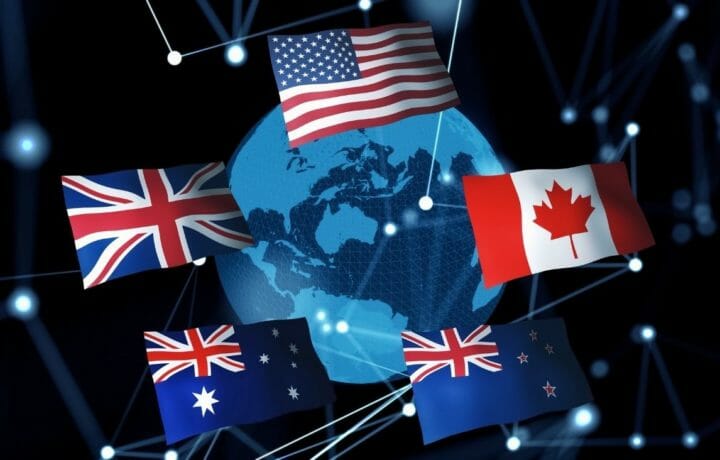The Five Eyes Alliance, which is the intelligence-sharing arrangement between the English-speaking democracies including the United States, the United Kingdom, Australia, Canada and New Zealand, has had a few setbacks in recent years. While it has been seen as one of the world’s most successful intelligence alliances, there were cracks in its very foundation last year when the British government opted to go ahead with allowing the Chinese-based tech giant Huawei to build out the UK’s 5G network.
However, last summer Prime Minister Boris Johnson reversed course, and followed the other Eyes in banning the use of technology from the Chinese firm. It looked like the alliance, which was formed in 1946 among the five English-speaking nations as a way to share security information, was back on solid footing.
New Cracks in the Eyes
There has been a new – and potentially bigger setback for the Five Eyes. Four of the members have jointly condemned China’s treatment of its Uyghur population in the Xinjiang province, the BBC reported. The hold out, New Zealand, has also refused to condemn Beijing for its de facto military takeover of the contested South China Sea or its suppression of democracy in Hong Kong.
New Zealand, which is a nation that has prided itself for its record on human rights, has also been largely silent on Beijing’s stance towards Taiwan, which the Chinese Communist Party has vowed would be “reunited” with the mainland by 2049.
Even as New Zealand’s Prime Minister Jacinda Ardern has said that it increasingly “harder to reconcile” its differences with China, the country has maintained its bilateral relations with Beijing. This has driven a wedge between its neighbor and ally, Australia.
This could be a bigger wedge in fact than the UK’s rollout of 5G.
“The 5G deployment was a big deal and it took a lot of effort to get the UK out of the deal,” explained Howard Stoffer, Ph.D., associate professor in the national security department at the University of New Haven.
Economic Partners
The sticking point for New Zealand is that China is now the South Pacific nation’s largest export market, while New Zealand depends on China for close to 30% of all exports, mostly dairy products.
Australia also depends on China for export, but its government in Canberra has taken a much harder line to Chinese expansion and even vetoed a major Chinese investment in the state of Victoria, which the BBC reported was to be part of Beijing’s “Belt and Road” initiative.
China and Australia have been engaged in a trade war, and the biggest winner has been New Zealand, which has ever-closer trade relations with Beijing.
A Black Eye
The issue is what this could mean for the future of the Five Eyes, and whether New Zealand could find itself shut out. However, the important aspect of this is that the actual intelligence that is shared isn’t likely as sensitive as some may think.
Stoffer explained to ClearanceJobs that any sharing still go through specialized channels, and nothing that is shared would be especially “surprising to read, or would cause serious damage if it got out in the press.”
Likewise, intelligence sharing still continues bilaterally. The United States and the UK with its “Special Relationship” already share information bilaterally and that is unlikely to change. If New Zealand were to find it out of a new “Four Eyes” alliance, the U.S. would likely continue to operate with the nation in a similar manner.
Breaking Up Alliances
The bigger issue isn’t the sharing of information, but the damage Beijing could do by potentially creating cracks in these important alliances and partnerships.
“China is trying to implicitly threaten New Zealand economically, and pressure them to drop out of the Five Eyes,” Stoffer told ClearnaceJobs. “If they kowtow to Beijing it creates a slippery slope that goes beyond just the Five Eyes. First it could be New Zealand, and then possibly Australia, but Israel could be in a similar bind. And even members of NATO could be threatened.”
As more nations move closer to China, which is becoming an economic super power, it could change the dynamics at least in the sharing of information.
“It might not impact actual security,” said Stoffer. “But there will be consequences.”




